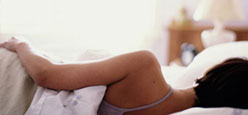Sleep Posture Does Matter

By Dr. Jean-Jacques Dugoua, ND
Have you ever wondered why it is difficult to sleep sitting up for very long? We often find ourselves dozing during a long flight, in the car, at school or at work, but the hard, uncomfortable seats and benches provided in public places aren't conducive to a restful sleep. Those who do manage to fall asleep in a seated position often awaken feeling groggy, with a headache and sometimes feeling slightly nauseous. Perhaps our bodies were not designed to sleep in an upright position.
A study was conducted at the University of California, San Francisco on the effects of the baroreceptor response during sleep in an upright posture. Baroreceptors are pressure receptors located in the wall of the heart that are sensitive to increased blood pressure. They may induce sleep. Twenty eight men were exposed to four different sleep conditions on separate days: upright (40-degree head tilt), lying (no head tilt), with positive pressure on the legs and with no positive pressure on the legs. The subjects' heart rate and blood pressure were measured as was the electrical activity of the brain (brain waves) using highly sensitive recording equipment attached to the scalp (an EEG). The results showed that when the men slept in an upright position, they had a decreased baroreceptor response and increased brain wave activity, thereby inhibiting sleep. The drop in baroreceptor response confirmed the hypothesis that sleeping in an upright posture increases brain wave arousal and interferes with normal sleep.
Not only is our sleep disturbed when we sleep sitting up, but let us not forget the strain on the muscles, tendons and ligaments of the neck and upper back. This can lead to chronic headaches, bad posture, chronic upper back, shoulder or scapula pain and even nerve pinching. If you often find yourself nodding off at work, school or anywhere else, perhaps it is time to make some lifestyle and health changes. Exercise, a healthy diet and vitamin and mineral support can improve sleep quality and boost energy, thereby eliminating the need for napping at less-than-ideal moments. Orthopedic and inflatable pillows are available for travelers to minimize neck strain.
When it comes to sleep, don't keep your head up, keep it comfortably flat.
www.truestarhealth.com
Have you ever wondered why it is difficult to sleep sitting up for very long? We often find ourselves dozing during a long flight, in the car, at school or at work, but the hard, uncomfortable seats and benches provided in public places aren't conducive to a restful sleep. Those who do manage to fall asleep in a seated position often awaken feeling groggy, with a headache and sometimes feeling slightly nauseous. Perhaps our bodies were not designed to sleep in an upright position.
A study was conducted at the University of California, San Francisco on the effects of the baroreceptor response during sleep in an upright posture. Baroreceptors are pressure receptors located in the wall of the heart that are sensitive to increased blood pressure. They may induce sleep. Twenty eight men were exposed to four different sleep conditions on separate days: upright (40-degree head tilt), lying (no head tilt), with positive pressure on the legs and with no positive pressure on the legs. The subjects' heart rate and blood pressure were measured as was the electrical activity of the brain (brain waves) using highly sensitive recording equipment attached to the scalp (an EEG). The results showed that when the men slept in an upright position, they had a decreased baroreceptor response and increased brain wave activity, thereby inhibiting sleep. The drop in baroreceptor response confirmed the hypothesis that sleeping in an upright posture increases brain wave arousal and interferes with normal sleep.
Not only is our sleep disturbed when we sleep sitting up, but let us not forget the strain on the muscles, tendons and ligaments of the neck and upper back. This can lead to chronic headaches, bad posture, chronic upper back, shoulder or scapula pain and even nerve pinching. If you often find yourself nodding off at work, school or anywhere else, perhaps it is time to make some lifestyle and health changes. Exercise, a healthy diet and vitamin and mineral support can improve sleep quality and boost energy, thereby eliminating the need for napping at less-than-ideal moments. Orthopedic and inflatable pillows are available for travelers to minimize neck strain.
When it comes to sleep, don't keep your head up, keep it comfortably flat.
www.truestarhealth.com
MORE
- How to Conquer Bad Winter Health Habits
- Resident Evil: What Lies Outside'
- 1.5 million for 1.5 million Victorians...
- Be U Not a Bully Forum for Parents and Teens
- New Screening Test Recommended To Help Prevent...
- Vitamin D Mushrooms May Solve Health Dilemma
- Gemma Howorth World-First Solates Class Interview
- Federal Government Clarifies Carer Allowance...
- Fiona Clark Sleep Problems Linked to Bullying...
- Elective Surgery and Emergency Care on Increase
- Emotional Stress Proves to be a Pain in the Back
- CPSA applauds Choice IPL and Laser Regulation...
- Karen Kaye Complementary Medicines Are...
- Danielle Stowasser Pain Relief Interview
- Dr Weng Sam Type 2 Diabetes Medication Interview
- Blood Clots and Stroke Fourth Indicator
- An Unhealthy Mouth can lead to Heart Disease
- Sharing MS Diagnosis Key To Retaining Employment
- CanTeen Counselling Service
- Australia Leads The Way With HPV Vaccination Of...





